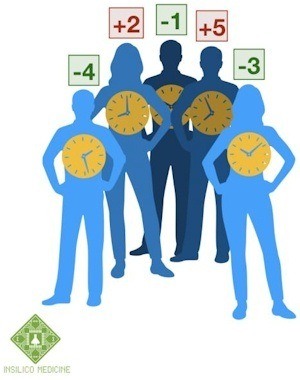Population Specific Deep Biomarkers of Aging
Author: InSilico Medicine, Inc.
Published: 2018/01/11 - Updated: 2024/04/09
Publication Details: Peer-Reviewed, Announcement
Category Topic: Longevity - Related Publications
Page Content: Synopsis - Introduction - Main
Synopsis: Population-specific biomarkers of human aging: a big data study using South Korean, Canadian and Eastern-European patient populations. In the paper, the authors present a novel deep-learning based hematological human aging clock, a biomarker that predicts the biological age of individual patients.
Introduction
Insilico Medicine, Inc., a company specializing in the application of artificial intelligence for drug discovery, biomarker development and aging research, has announced a publication of a research paper titled "Population-specific biomarkers of human aging: a big data study using South Korean, Canadian and Eastern-European patient populations" in The Journal of Gerontology.
Main Content
In the paper, the authors present a novel deep-learning based hematological human aging clock, a biomarker that predicts the biological age of individual patients. This big data study uses a large dataset of fully anonymized Canadian, South Korean and Eastern European blood test records to train an aging clock.
The developed model predicts the age better than models tailored to the specific populations highlighting the differences of subregion-specific patterns of aging. In addition, the developed clocks were shown to be a better predictor of all-cause mortality than chronological age. The paper includes co-authors from Gachon University Gil Medical Center, University of Copenhagen, University of Alberta, and the Biogerontology Research Foundation.

"If we are to develop actionable biomarkers of aging, we need a comprehensive and robust approach. Such an approach can only be developed using a large number of samples from multiple populations. We are working on multiple biomarkers using deep learning and incorporating blood biochemistry, transcriptomics, and even imaging data to be able to track the effectiveness of the various interventions we are developing". said Polina Mamoshina, a senior research scientist at Insilico Medicine.
"The pursuit of biological aging clocks is a major focus point of the aging field and is a key step in the development of interventions in human aging. This paper represents the evolution of the first easily adaptable clock that can be applied at a population level regardless of population biases. The clock is very cost-effective, without the requirement of next-generation sequencing or other specialized equipment. It is therefore extraordinarily suited for testing aging-interventions in multiple settings across the globe." said Morten Scheibye-Knudsen, MD, Head of the Biology of Aging Laboratory, Center for Healthy Aging, and associate professor, University of Copenhagen.
"Development of effective biomarkers of age is one of the most pressing goals in geroscience today, as it lays the foundation for efficient preclinical and clinical evaluation of potential healthspan-extending interventions. Humans live a long time, and testing the effect of gerontological interventions in humans using lifespan gains as the main criterion for success would be wildly impractical, necessitating long and costly longitudinal studies. By developing accurate biomarkers of aging, the efficacy of potential healthspan-extending interventions could instead be tested according to changes in study participants' biomarkers of age. While significant attention is paid to the development of highly accurate biomarkers of aging, less attention is paid to developing actionable biomarkers of aging that can be tested inexpensively using the tools at hand to the majority of researchers and clinicians. We developed the deep-learning based, blood biochemistry aging clock presented in this paper in the hopes of making progress toward the goal of more actionable biomarkers of aging" said Franco Cortese, co-author of the paper and Deputy Director of the Biogerontology Research Foundation.
"This work demonstrates the synergy between artificial intelligence and aging research. Every living being has age as a feature and it is possible to engage in multi-national collaborations using the very simple data types to assess the population specificity of age predictors. Our group is using advanced AI for multiple clinical applications and has a working collaboration with IBM Watson, but working with Insilico Medicine is a pleasure", said Lee Uhn, PhD, Chief of Artificial Intelligence at the Gachon University Gil Medical Center.
"Age is one of the features possessed by every living creature. In 2015 we made a very neat discovery - when we train the deep neural networks to predict the age of the person, the DNNs capture the most biologically-relevant features and can be re-trained on diseases and can be used to integrate the multiple data types and also extract the most important features within each data type and across the data types. In this paper we show one of the proofs of concept on a very simple and abundant data type that we can now assess the population-specificity of the predictors, the importance of ethnicity and population group in age prediction and the differences in the most important features contributing to the accuracy of these predictors", said Alex Zhavoronkov, PhD, CEO of Insilico Medicine, Inc.
This work may help improve clinical trial enrollment practices, assess the population specificity of a variety of the biomarkers and pave the way for the development of more complex multi-modal biomarkers of aging and disease.
Attribution/Source(s): This peer reviewed publication was selected for publishing by the editors of Disabled World (DW) due to its relevance to the disability community. Originally authored by InSilico Medicine, Inc. and published on 2018/01/11, this content may have been edited for style, clarity, or brevity.